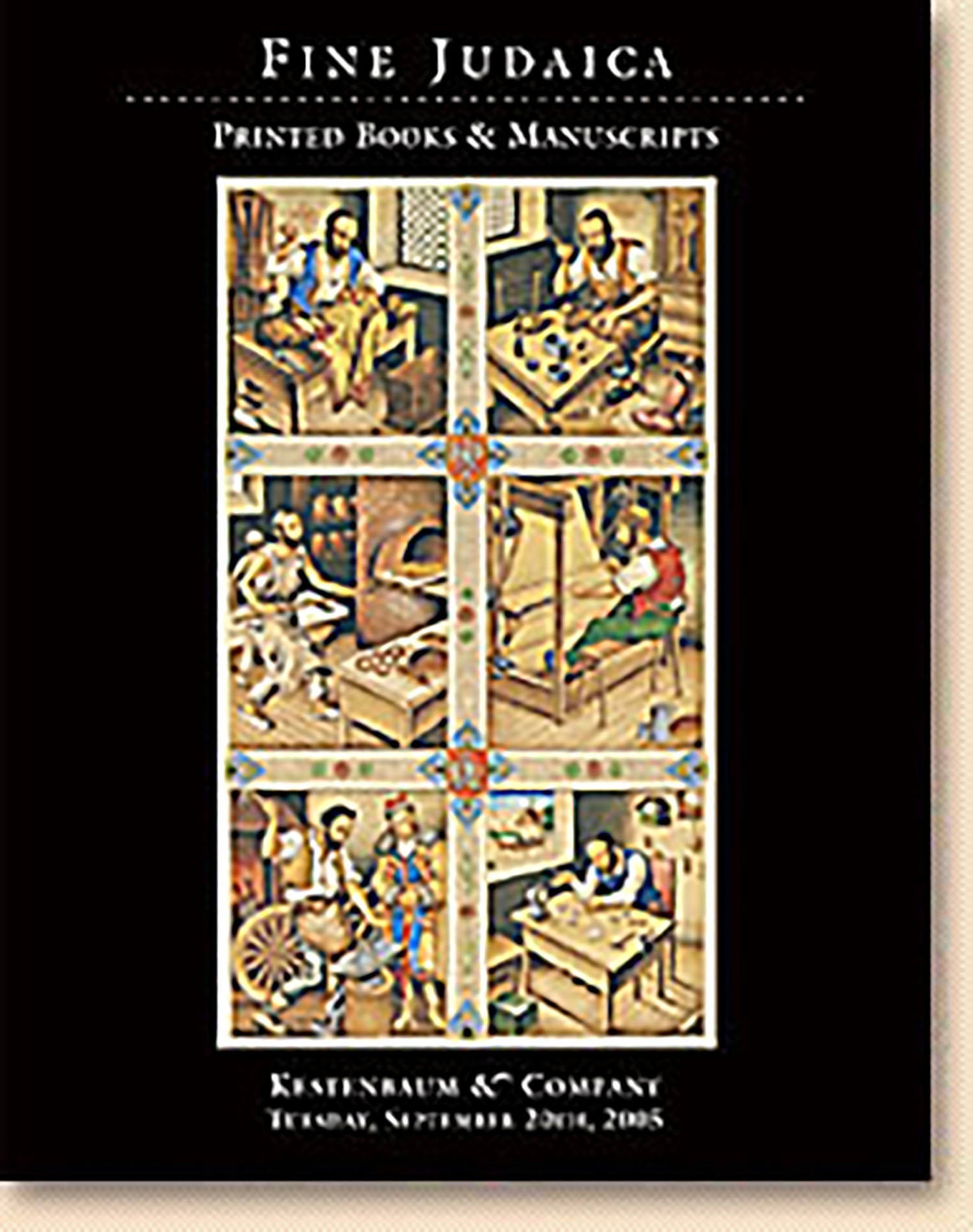(AMERICAN JUDAICA).

AUCTION 30 |
Tuesday, September 20th,
2005 at 1:00
Fine Judaica: Books and Manuscripts
Lot 15
(AMERICAN JUDAICA).
Est: $6,000 - $8,000
PRICE REALIZED $8,500
First Anthology of Jewish Sermons in America.
Central to Isaac Leeser’s career as a pioneering American rabbi was his role as a preacher. He delivered more than two hundred fifty sermons over his lifetime. Some were published in pamphlet form or in his Occident monthly. In 1837 he issued Discourses … First Series, a two-volume anthology of fifty-two sermons. The first anthology of sermons by an American Jew. Discourses was eagerly anticipated by communities across the United States, Canada and the Caribbean. Subscribers included individuals living in New York, Philadelphia, Myerstown (PA), Stouchstown (PA), Tappahannock (VA), Kingston (Jamaica), St. Thomas (West Indies) and Bridgetown (Barbados).
Leeser’s Discourses marked a coming of age of the American synagogue and ministry. Leeser was well aware of the pioneering nature of his activities as a preacher. In his introductory survey of the state of Jewish preaching in vol. I, he wrote: “I believe that it may be said without any vanity on my part, that in our Synagogue was the first attempt made for about ten years past to give religious instruction in lectures." Leeser called for the revolutionizing of the American Jewish ministry by introducing regular preaching in English, and he wrote of the need to establish Jewish schools to train America preachers. Ironically, Leeser faced severe opposition to his interest in preaching from the leaders of his own congregation, Mikveh Israel of Philadelphia. The tensions are evident in the introduction to the Discourses, from his remarks chastising synagogue officers for mixing into the spiritual concerns of the synagogue and he called on them “to confine themselves strictly to their branch of [temporal] duty, and leave the public worship in the public hands of those elevated to conduct it.” Congregational leaders had vehemently opposed his efforts to expand the role of the American Jewish clergyman and they rejected his insistence that his contract be emended to permit him to preach at will on whatever subject he desired without first securing the approval of the president. These demands ultimately cost Leeser his job following a protracted and nasty public battle, but the momentum he initiated in the larger community could not be stopped by a few congregational leaders. After the publication of his Discourses the sermon increasingly became accepted as a central feature of the synagogue service; eloquence and oratory skills became important qualifications for any rabbi seeking an American pulpit.
Leeser’s Discourses was a valuable contribution to the spiritual life of his contemporaries. It remains invaluable today as a tool for historians studying the period. As early as 1869, Judge Mayer Sulzberger highlighted the larger implications of the publication of Leeser’s sermons in a review of the Third Series: “Irrespective of the merits, which the most casual reader will recognize, the book contains much historical information, respecting American Jews; and indeed will be one of the main sources for a history of Judaism in our country … Every Jew who is interested in the events that have befallen his co-religionists here, during the last forty years … will be glad to possess the work” (Occident, vol. 26, pp. 237-8)
On Leeser as a preacher and his Discourses, see Lance Sussman, Isaac Leeser and the Making of American Judaism, pp. 60-67, 77, 87-88, 120-121, 241.
Leeser’s The Claims of the Jews to An Equality of Rights, relates to the appearance of anti-Jewish articles in British journals, to which Leeser felt compelled to respond in a series of letters to the Philadelphia Gazette in 1839. The publication of the letters “helped establish Leeser’s name across the growing country and beyond” (Sussman, p. 102) and they were reprinted, with a new introduction and annotations in the present form. Leeser used his response to the British journals as an opportunity to “thwart the efforts of Christian missionaries, reveal their ignorance of Judaism, and establish Judaism as a full and protected sector of religion in America” (Sussman, p. 106). Regarding the latter motive, Leeser noted in the introduction, “in America the Jew has no occasion to advocate his claims to equal rights [due to] perfect equality with his Christian neighbour.” Nonetheless, he continued, “This is true in law; but we are a very small minority, living in detached bodies among those holding opinions differing from ours; and it is therefore our duty, if possible, to disabuse our neighbours of any unfounded suspicions they might be induced to adopt concerning us.” Leeser thus felt obligated to respond to British anti-Semitism even though written from the other side of the Atlantic, “the fact of the very extended circulation of British reviews” meant that Americans could become infected with their poisonous ideas. Leeser concluded the introduction with a promise: “I shall be ever ready to enter upon a defence of our people and faith.” Shortly thereafter he had the opportunity to prove he remained true to his promise by emerging as a leader of American protests against the Damascus blood libel of 1840.
